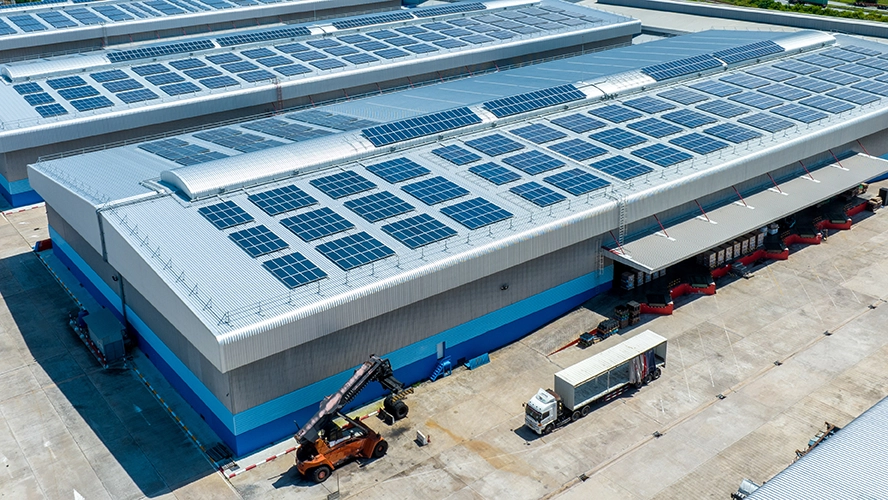Solar Panels Can Provide Many Benefits to Commercial Facilities
With the cost of electricity continuing to skyrocket, businesses are scrambling to find ways to save money and installing solar panels on your roof could prove to be very beneficial for any commercial building roof type.

According to the U.S. Department of Energy, there are two tax credits available for businesses.
- The investment tax credit (ITC) reduces your federal income tax liability for a percentage of the cost of a solar system installed during the tax year.
- The production tax credit (PTC) is a per kilowatt-hour (kWh) tax credit for electricity generated by solar and other qualifying technologies for the first ten years of a system’s operation which reduces federal income tax liability and is adjusted annually for inflation. Note: business owners cannot claim both the ITC and PTC for the same property. Solar systems placed in service in 2022 or later or that will begin construction before 2033 are eligible for a 30 percent ITC or a 2.75 ¢/kWh PTC if they meet labor requirements issued by the Treasury Department or are under one megawatt in size.
Since solar panels offer such a compelling combination of cost savings, energy independence, and environmental benefits, they are a smart investment for any commercial facility and in addition to tax credits, solar panels offer many other benefits to industrial facilities including:
Cost Savings
- Solar panels can significantly lower electricity costs by generating power on-site which reduces reliance on grid electricity.
- In addition to government tax credits, grants and rebates are also available to businesses that invest in solar energy.
- Over time, the savings on energy bills can offset the initial investment for solar power, resulting in a strong return on investment.
Environmental Benefits
- Solar energy is a clean, renewable source that produces no greenhouse gas emissions which helps businesses reduce their environmental impact and carbon footprint.
- Installing solar panels can also help businesses meet corporate social responsibility and sustainability goals.
Energy Reliability
- With the addition of battery storage, solar panels can provide backup power during grid outages, ensuring uninterrupted business operations.
Scalability and Flexibility
- Solar panel systems can be scaled according to the size of the roof and energy needs of a facility, making it a flexible solution for businesses of all sizes.
- Businesses can also expand their solar system as their energy needs grow, making it a future-proof investment.
So, what do you need to do before they are installed? It’s important to take the following steps to ensure your solar panel project is successful.
- Conduct an assessment and feasibility study for your facility which can be achieved by performing an energy audit to understand your facility’s current and future energy needs. This will help determine the size of the solar system required.
- Conduct a proper commercial roof assessment to evaluate your roof’s structural integrity and the condition of your roof. It’s crucial to ensure your roof can support the weight of the solar panels. If you currently do not have a commercial roof maintenance plan, get a roof inspection performed immediately. Roof age, material, and load capacity are serious factors to consider before installing a solar system. You should also evaluate your roof’s orientation, shading, and available space to optimize solar panel placement for maximum sunlight exposure. If you have many components on your roof, such as HVAC systems, this equipment could present issues if there isn’t enough space for the panels.
Here is a helpful article about engaging roofing contractors when installing new equipment on your roof.
Most importantly, you need to ensure that your roof is in good condition. If you do discover problems, can the roof be repaired instead of replaced? If the commercial roof inspection shows your roofing material should be replaced, this must be performed before solar panels are installed. When it is eventually time for a roof replacement down the road, the solar panels will need to be removed and placed back on top of the roof. - Conduct a financial analysis. Estimate the total cost for the project, including equipment, installation, permits, and any potential upgrades to your facility’s electrical system. In addition, research available tax credits, rebates, and incentives. Consider financing options such as loans, leases, power purchase agreements, or Property Assessed Clean Energy financing.
- Work with a professional commercial roof care company, such as Capital Roof Care to help you find a reputable solar panel company. You should choose an experienced solar installer with a proven track record in commercial solar projects. Be sure to verify their certifications, references, and insurance coverage. The right contractor can help you determine crucial considerations, such as:
- System Sizing: Determining the number of panels needed and the overall capacity of the system, based on the energy audit and available roof space.
- Electrical Design: Planning the integration of the solar system within your facility’s existing electrical infrastructure. Items that should be considered include inverters, wiring, and connection to the grid.
- Permits: Obtaining the necessary permits from local authorities, which can include building permits, electrical permits, and grid interconnection agreements.
- Solar Panels and Inverters: Selecting high-quality solar panels and inverters that will meet your facility’s needs. Consider factors such as efficiency, warranty, and brand reputation.
In addition to managing the installation, your solar contractor should provide inspection, commissioning, and any follow-up or maintenance that is required.
Adding solar panels to a commercial facility is a complex process that requires careful planning, coordination with experts, and adherence to regulations. However, with the right approach, it can lead to significant cost savings, energy independence, and environmental benefits for your business no matter what type of commercial roof you have. For more information or assistance in this process, contact Capital Roof Care.
Sources: